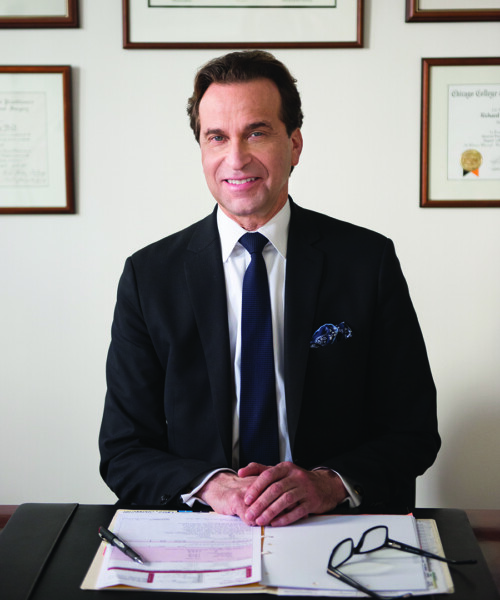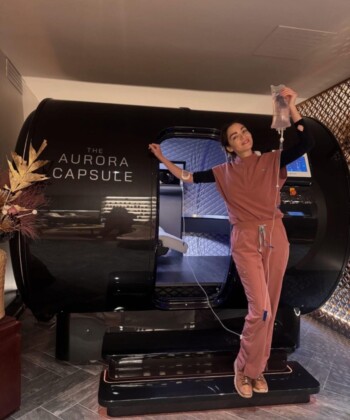Seated behind a majestic mahogany desk in his Upper East Side office, Dr. Richard Firshein sits with absolute perfect posture as he sifts through charts and papers that hold the answers to my past, present, and future state of wellness. As he meticulously makes his way through the results, he emphasizes repeatedly that his plan to get me into the healthiest version of myself involves a highly customized and ongoing program, as well as individualized testing, to determine why I am fatigued, get frequent headaches, and often feel foggy (among many other complaints). He runs me through a series of blood tests, then moves on to DNA testing and very thorough allergy testing. This is my plan, but it differs for everyone, and that is really his point when it comes to the field of medicine and optimization.
His namesake practice, the Firshein Center, is an integrative and precision-based medical practice in which everything—from the testing to the long-term longevity plan—is custom. “I practice old-fashioned medicine with a high-tech approach,” he says with utmost precision. “My practice focuses on a holistic approach, which looks at your DNA, allergies, gut biome, hormones, toxicity, autoimmune conditions, and nutritional levels, to name a few.”
His approach was inspired by his own life-threatening experience with his health. “Growing up, I suffered from severe food allergies and asthma that landed me in the hospital,” he says. “For many years, I was seen by doctors, prescribed medications, yet nothing was helping. No one was trying to dissect what was really wrong.” Things got a lot worse before they got better. A stint in intensive care was his aha moment that eventually led him to found his practice. “I was with friends [in the hospital], colleagues, doctors, but again, no one was able to do anything for me. I took about a year off to get off all of the medications I was prescribed at that time. At that point, I dedicated myself to finding a treatment for myself. If I was able to figure out my own health, I would be able to convey that knowledge to patients.”
For him, the process of starting his center began with gaining an internal concept of creating a better way to think about medicine for others, based on his experience with going undiagnosed for so long. “Once I learned and understood what I was passionate about, I embarked on my journey and opened my own practice, the Firshein Center for Integrative Medicine, in 1991—my own version of what I call today precision-based medicine or ‘me medicine.’ ”
How does a visit with him differ from those with the doctors you’ve been seeing your entire life? “Traditional medical practices generally work with a formula—you make a diagnosis and either that person needs a drug or they need to go for surgery, and there may be some follow-up care,” he says. “My practice offers patients a curated experience where we take a deep dive and look at all the factors that each person may be dealing with. For example, looking at a patient’s gut biome, DNA, nutritional vitamin levels, hormones, allergies, and toxins they may have been exposed to. From there, we’ll put together a specific program for each individual.”
Firshein also speaks to the importance of thinking about long-term health instead of putting a Band-Aid on current issues. “What we really should be talking about is health extension and then longevity. Although I use words like ‘antiaging’ or ‘detox,’ I really find them too narrow and often too negative. Most of my patients don’t want to just live longer if they can’t be healthy. So, I came up with the idea of health extension and longevity, or HEAL. And really, who doesn’t want to be HEALed? Because if we are to maintain our health, we need to extend our health and life span.”
He warns that if doctors don’t customize their approach to each patient, they’re bound to miss issues. “We understand uniqueness and that everyone has specific differences—how we respond to our environment, the medical problems we’re prone to—and it really requires a deep understanding of all those factors to understand someone’s health,” he says. “We’re at a new frontier in medicine. We know that each person has a very unique set of genetic markers that determine the direction that their health will take, and we have the technology available to test these now.”






































